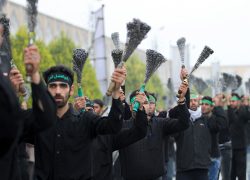Haj Mohammad-Hussein Kazeruni was one of the merchants of the late Qajar and early Pahlavi periods.
Kazeruni, who was known as the second richest man in Isfahan, began his economic activities by founding two companies named Eslamieh and Masoudieh, with the aim of introducing local productions to the market.
He was also one of the constitutional activists of Isfahan during the Persian Constitutional Revolution, especially in its first period.
The foundation of the Merchants’ Guild of Isfahan was also indebted to him. His achievements include the maintenance of Chahar-bagh and the construction and development of new streets.
Haj Mohammad-Hussein had an important role in the political and social history of Isfahan during the late Qajar and early Pahlavi periods.
Helping the needy, supporting Iranian industry, and building non-profit centres are some of his important works. He was also one of the founders of the Melli (National) Bank during the period of the Constitutional Revolution.
It is said that Haj Mohammad-Hussein Kazeruni was a patron of the theatre, to the extent that he allocated the Golzar Hotel in Kazeruni Alley, Chaharbagh Street, for the use of artists and theatre pioneers.
After that, Ali Sadri too builds a theatre salon in front of the area nowadays known as Sepahan Alley, with a capital of thirteen thousand tomans.
After some time, with the efforts of the patrons of theatre, the Sepahan Theatre starts operating in the year 1323 SH.
Since the services of Mohammad-Hussein Kazeruni were innumerable, after his death, a large number of Isfahan’s population accompanied his body to the Takht-e-foulad Cemetery.
A part of this funeral procession is recounted in “Isfahan Nesfe Jahan” by “Sadeq Hedayat:”
“I heard that because of his death, a procession gathered that sang this elegy: ‘He left the mortal world, the Honorable Mr. Kazeruni/ we are left in the dust, because of this sudden loss.’ I was in a photo studio yesterday. The photographer said that he had spent two days enlarging Mr. Kazeruni’s image, and that today being the Tasua, the people are going to the Takht-e-Foulad Cemetery to pray for him.”







